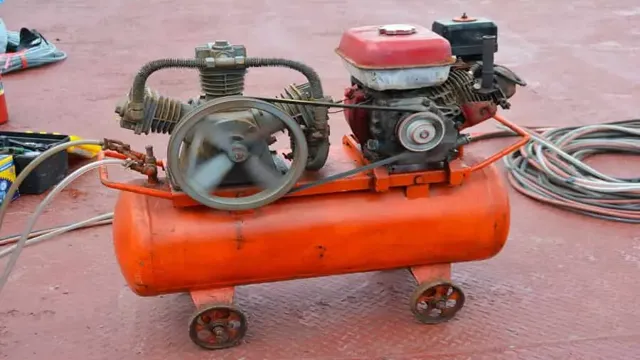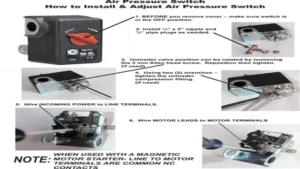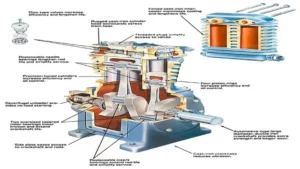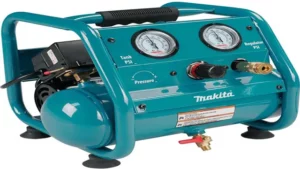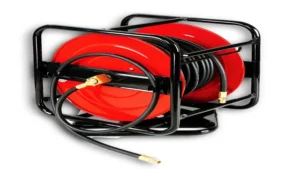Getting ready to travel can be a stressful experience, especially if you’re packing something that you’re unsure about. For anyone who needs to bring an air compressor along with them on a flight, this can be a daunting task. After all, air compressors are heavy and bulky, which can make them difficult to transport.
But, with the right preparation and knowledge, taking air compressor on a plane can be easier than you imagine. In this blog post, we’ll cover everything you need to know, from regulations around air compressors on planes to tips for packing and handling.
Know Your Air Compressor
If you are planning on taking an air compressor on a plane, it’s important to know that it’s generally not allowed in your carry-on or checked luggage. Air compressors can contain compressed gas cylinders which are considered hazardous materials and are subject to strict transportation regulations. However, certain types of compressors can be allowed, as long as they comply with the airline’s specific rules and regulations.
Before traveling, it’s best to contact your airline and check their policy on carrying air compressors. You may be required to provide documentation, such as a Material Safety Data Sheet or a Dangerous Goods Declaration, to prove that your compressor is safe for air travel. Additionally, it’s important to pack it properly in a sturdy, protective case to avoid any damage during transport.
Ultimately, carrying an air compressor on a plane can be possible if you follow the necessary guidelines and procedures.
Check Your Compressor’s Classification and Size
When it comes to air compressors, knowing your equipment is crucial to maximizing its efficiency and lifespan. One important aspect to consider is the compressor’s classification and size. This classification refers to the level of pressure and volume of air produced by the compressor, and it’s typically categorized into low, medium, and high classifications.
It’s vital to ensure that you choose the correct classification for your specific needs. Additionally, the size of the compressor should also be taken into consideration. A larger compressor may be necessary if you require a higher volume of air, while a smaller one may be more appropriate for smaller projects.
By knowing your compressor’s classification and size, you can ensure that you have the appropriate equipment to meet your needs, thus prolonging the life of your compressor and reducing the likelihood of costly repairs or replacements down the road.
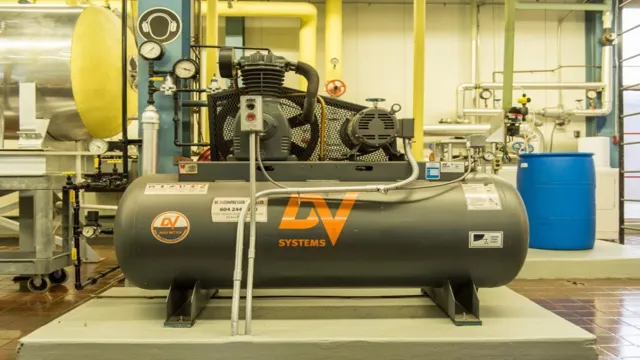
Understand the Regulations on Air Compressors on Planes
When it comes to air compressors on airplanes, it’s crucial to understand the regulations to ensure safety and compliance. First and foremost, not all air compressors are allowed on planes. Any air compressor brought on board must be approved by the Federal Aviation Administration (FAA) and must meet specific requirements for safety and performance.
It’s also important to note that the size and weight of the compressor must be considered, as it must fit within the airline’s luggage and weight restrictions. Additionally, certain airlines may have their own rules and regulations related to air compressors. Knowing the details of your air compressor and the regulations surrounding it will help ensure a smooth and safe flight.
So, before you pack your trusty air compressor for your next adventure, make sure to do your research and ensure it’s FAA-approved and meets all necessary regulations.
Packing Your Air Compressor
If you’re wondering whether you can take an air compressor on a plane, the answer is usually “yes”, but there are certain steps you’ll need to take to ensure your device is packed and transported safely. First and foremost, it’s important to determine if your compressor is oil-free, as oil-based models are generally prohibited on planes due to the potential fire hazard they pose. If you have an oil-free compressor, you’ll want to make sure it’s properly drained and cleaned before packing it in a sturdy, hard-sided case that meets the airline’s size and weight restrictions.
You should also make sure to remove any detachable parts and pack them separately to avoid damage during transit. Finally, it’s a good idea to label your case clearly with your name, contact information, and a detailed list of the contents so that airport security and airline personnel can quickly identify and handle your compressor in a safe and efficient manner. With a little bit of planning and effort, you can take your air compressor with you on your next flight without any worries.
Properly Secure Your Compressor
When it comes to storing or transporting your air compressor, proper packing is essential to prevent any damage or accidents during the process. Firstly, make sure you drain out all the air and moisture from the compressor before packing it. This will prevent any corrosion inside the compressor and also reduce the overall weight for easy handling.
Use sturdy and impact-resistant packaging material like foam padding or bubble wrap to wrap the compressor and secure it in place inside the box. Seal the box tightly using high-quality packing tape and label it properly with fragile or heavy load signs. Remember, properly packing your air compressor is crucial to ensure its safe transport and storage, so don’t compromise on the quality of the packaging.
By taking these simple steps, you can be sure that your compressor will be ready to use when you need it next.
Remove Any Hazardous Materials
When you’re packing your air compressor, it’s important to ensure that you remove any hazardous materials before doing so. This is for the safety of yourself, as well as those who may be handling your compressor at any point during the moving process. Some common hazardous materials that you may need to be cautious of include gasoline, oil, and other chemicals that may be flammable or corrosive.
To properly dispose of these materials, consider taking them to a local recycling or disposal center. By taking this step, you can rest assured knowing that your air compressor is safely packed and ready to be moved without causing harm to anyone or anything.
Choose the Right Baggage Option
When it comes to packing your air compressor for travel, it’s important to choose the right baggage option. You want to ensure that your compressor is secure and protected throughout the journey. One option is to pack it in a hard-shell suitcase or case designed specifically for air compressors.
These cases often have foam padding to absorb shock and prevent any damage to your compressor. Another option is to pack it in a large duffel bag and use your clothing and other soft items to surround and protect it. Just be sure to properly secure your compressor within the bag to avoid any shifting during transit.
Whichever option you choose, make sure to label your baggage as fragile to alert baggage handlers of its delicate contents. With the right packing, you can seamlessly transport your air compressor and have it at the ready for your next project or adventure.
Final Thoughts
If you’re wondering whether you can take an air compressor on a plane, the answer is not a straightforward one. It depends on the type of air compressor you have, as well as the airline you’ll be flying with. For instance, portable air compressors that use lithium-ion batteries must be in your carry-on luggage and must not exceed 100 watt-hours per battery.
You can also bring compressed air cylinders, but you’ll need to have them inspected for safety reasons. As always, it’s best to check with your specific airline before traveling to avoid any issues or confusion at security checkpoints. So, if you need to bring your air compressor with you on a flight, be sure to do your research ahead of time to ensure that you’re following all the regulations.
Consider Renting an Air Compressor at Your Destination
If you’re planning a DIY project or traveling to a job site, you may be wondering if it’s worth bringing your own air compressor or renting one at your destination. While there are pros and cons to both options, renting an air compressor at your destination may be the better choice. For starters, it can be a hassle to transport a bulky air compressor, especially if you’ll be flying or driving a long distance.
Renting one on site means you won’t have to worry about shipping or lugging it around. Additionally, renting allows you to choose the appropriate size and type of compressor for the job at hand. Plus, you won’t have to worry about maintenance or repair costs since those will be covered by the rental company.
Overall, renting an air compressor at your destination is a convenient and cost-effective option that can save you time and money in the long run.
Ask for Assistance from Airline Customer Service
In conclusion, when you encounter any travel disruptions, the best thing to do is to seek assistance from the airline’s customer service. Don’t hesitate to ask for help if you need it. They are there to help you and ensure that you reach your destination safely and comfortably.
Whether it’s a delayed flight, canceled flight, or any other issue, airline customer service agents are trained to handle the situation efficiently. They can rebook you on a new flight, provide you with compensation, or offer other options that will suit your needs. Remember, a little patience and a positive attitude can go a long way in making the situation less stressful.
Therefore, always keep in mind that the airline customer service staff is there to assist you in the best way possible.
Conclusion
In conclusion, taking breaks during work hours is vital for productivity and overall well-being. Whether it’s a short walk outside, a chat with a colleague, or simply closing your eyes and taking deep breaths, these breaks help decrease stress levels and recharge our minds. Studies have shown that constant work without any breaks can lead to burnout and decreased performance.
So, it’s important to prioritize taking breaks and making it a routine part of our workday. In the long run, taking breaks may help us achieve better results and feel more energized and motivated. Let’s make self-care a priority, and include breaks in our workday routine to achieve better work-life balance and boost productivity.
Conclusion
In conclusion, while it may seem tempting to bring your trusty air compressor on your next flight, it’s important to remember that airlines have strict regulations regarding which items are permitted on board. To avoid any confusion or potential headaches at the airport, it’s best to leave your air compressor at home and invest in some sturdy travel-sized pumps instead. After all, who needs heavy machinery when you’ve got some good old-fashioned elbow grease? Safe travels, my friends!”
FAQs
Can I bring an air compressor on a plane as a carry-on item?
No, air compressors are not allowed as carry-on items on planes due to safety regulations.
Is it okay to pack an air compressor in checked luggage?
Yes, you can pack an air compressor in your checked luggage as long as it is properly secured and meets size and weight limitations.
Are there any restrictions on the size of the air compressor I can bring on a plane?
Yes, the size of the air compressor should be within the airline’s baggage size and weight limits. You may need to pay additional fees for oversized or overweight baggage.
Can I bring compressed air cans, such as those used for cleaning electronics, on a plane?
Some airlines allow compressed air cans in carry-on luggage, while others do not. It is best to check with the airline before packing them.
Are there any specific guidelines for packing an air compressor in checked luggage?
Yes, make sure to drain the air compressor of any fluids, secure it in a sturdy container or bag, and label it as fragile.
Can I bring an air compressor that runs on batteries on a plane?
Yes, as long as the battery meets the airline’s guidelines for lithium-ion batteries and is properly stored and secured.
What should I do if I have questions about bringing an air compressor on a plane?
You should check with your airline’s regulations or call their customer service hotline for guidance on bringing an air compressor on a plane.
